2010中考复习之动词时态-helen1
图片预览

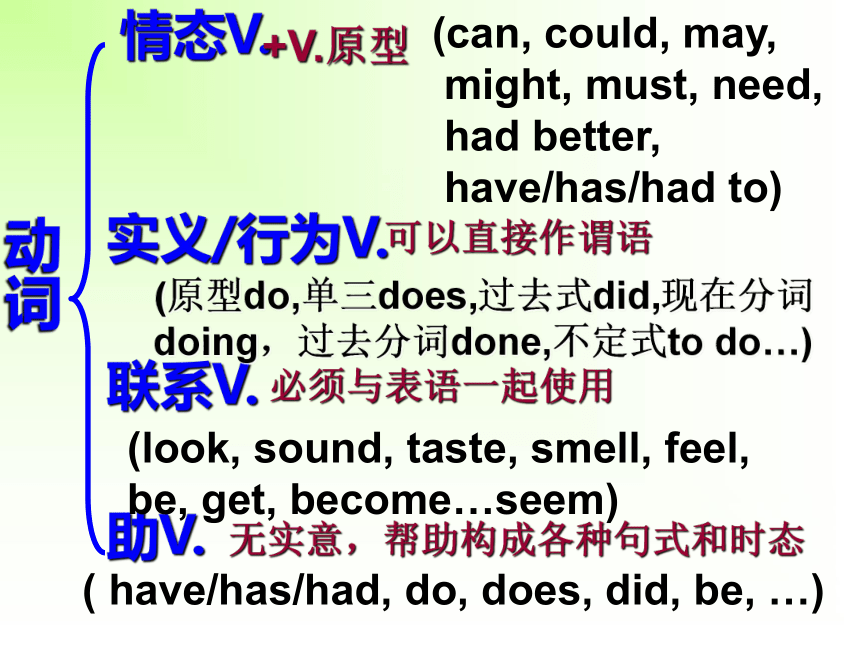
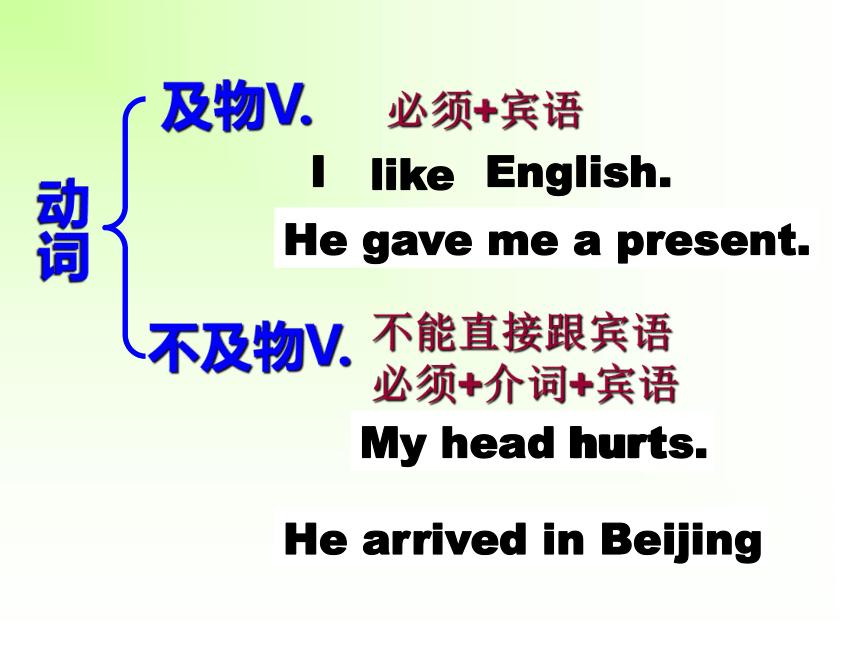
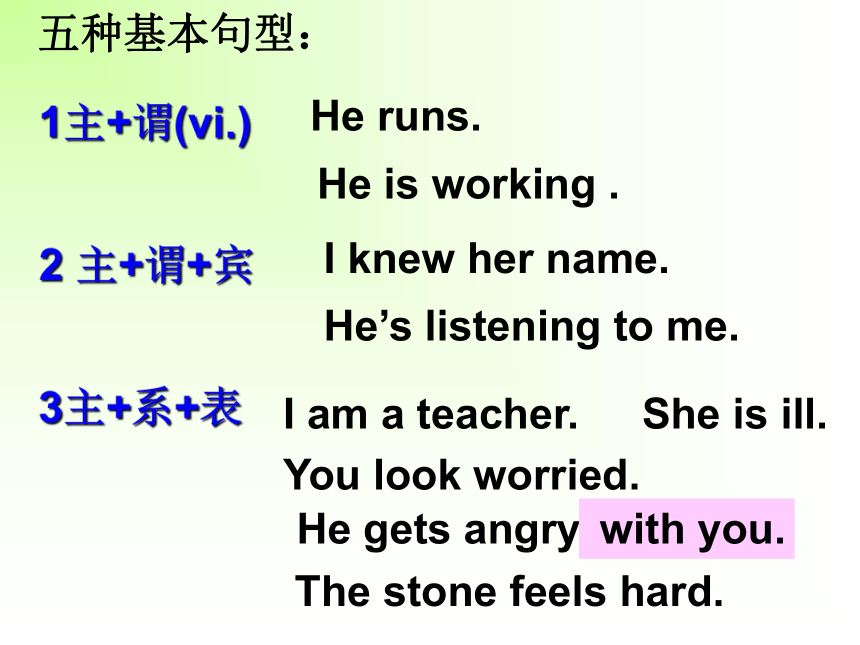
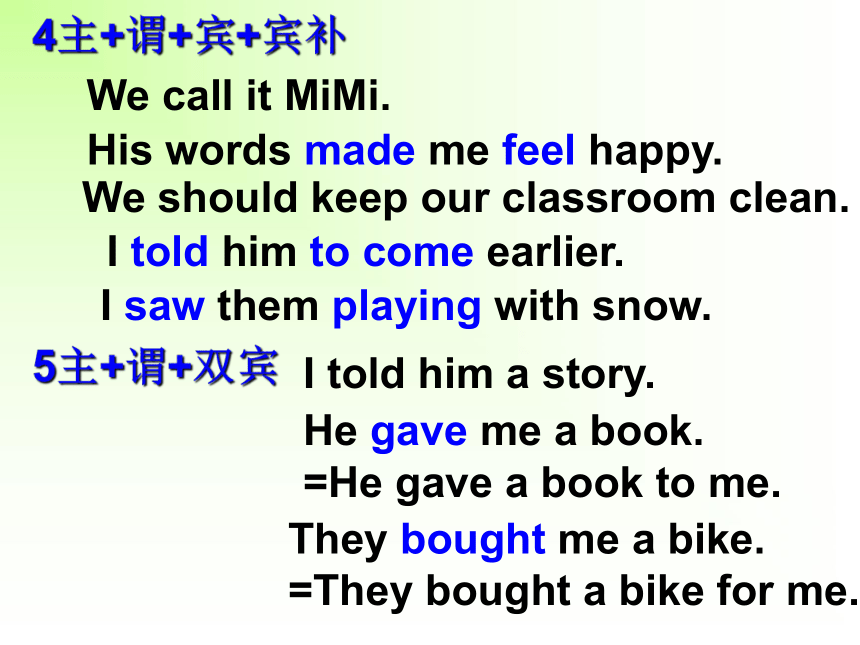
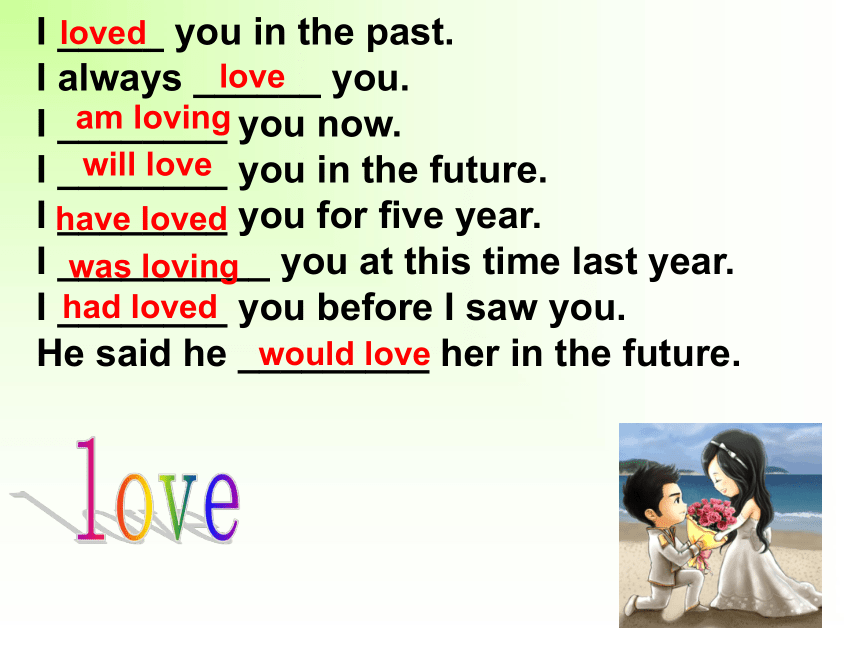
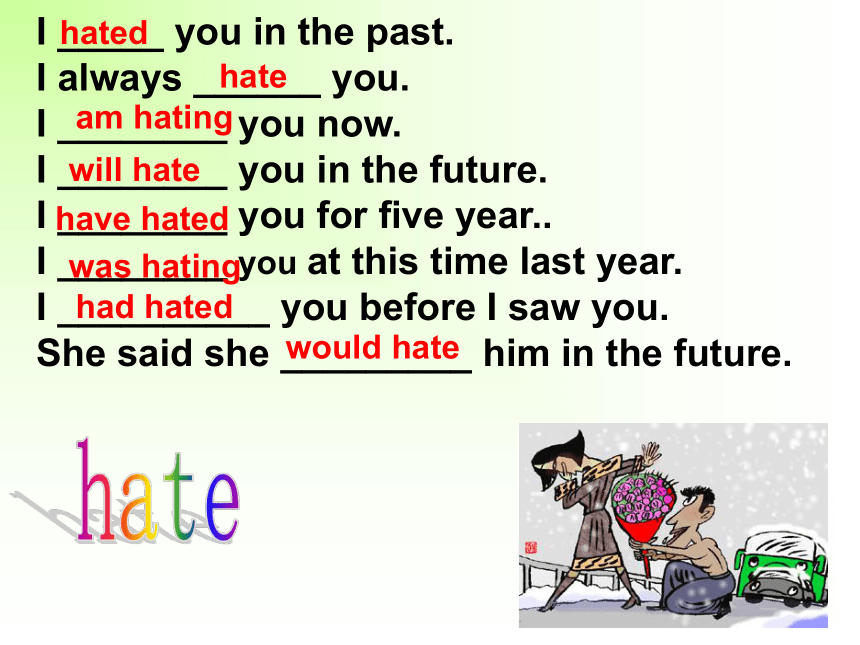
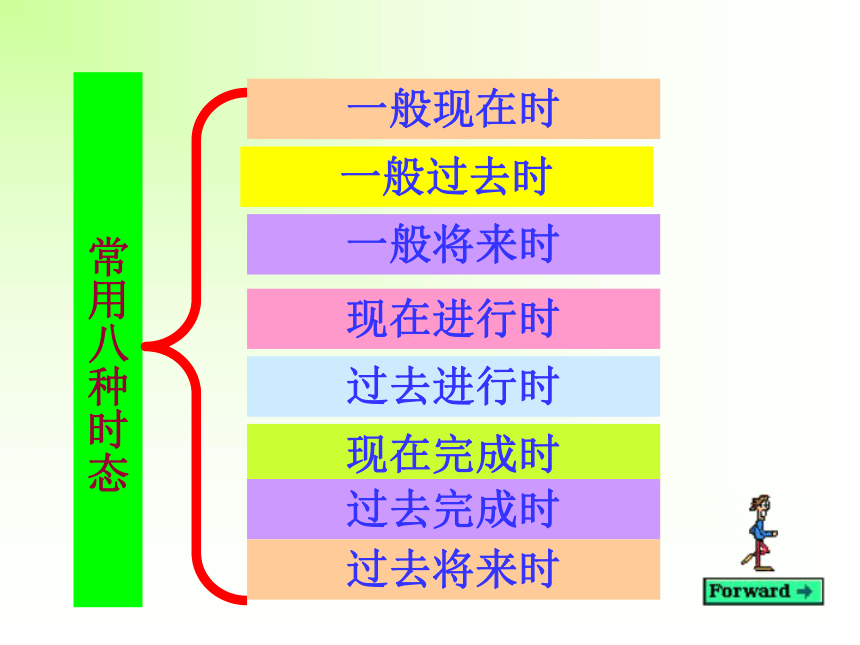
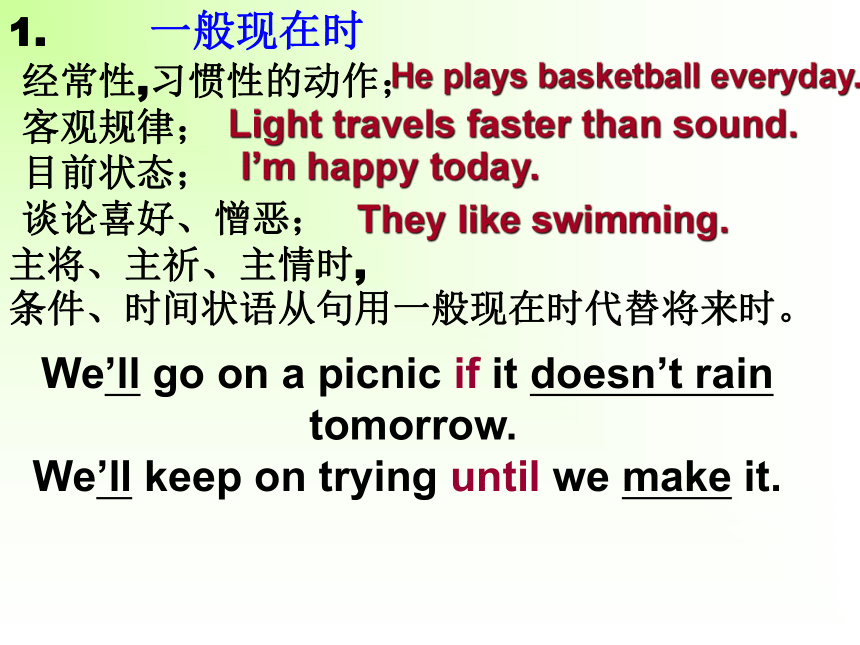
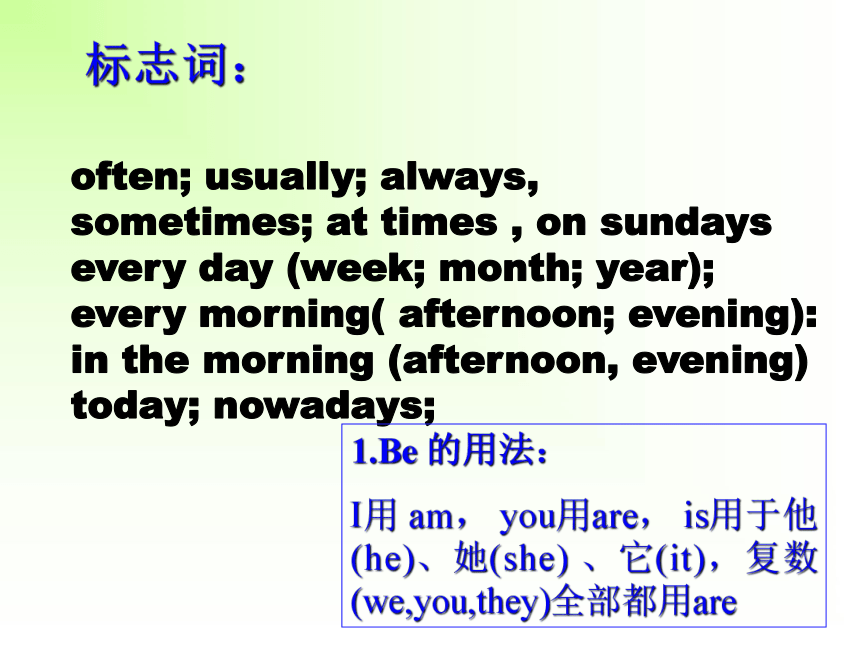
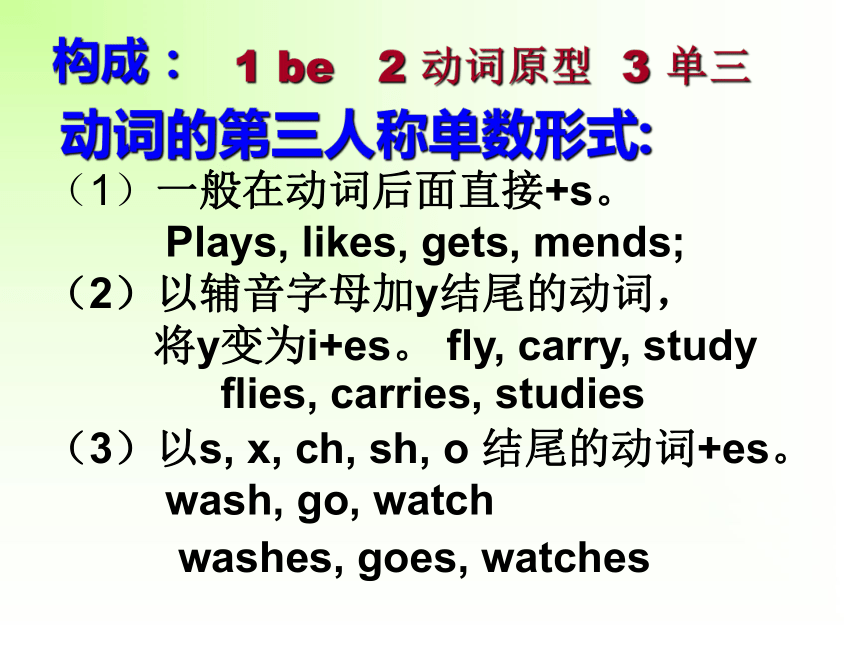
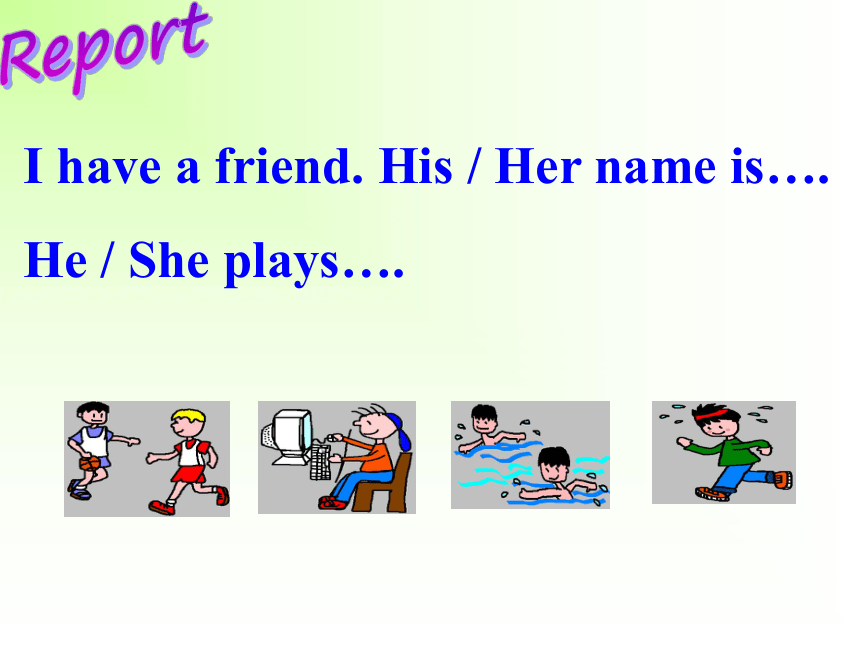
文档简介
(共63张PPT)
情态V.
实义/行为V.
联系V.
助V.
+V.原型
(can, could, may,
might, must, need,
had better,
have/has/had to)
无实意,帮助构成各种句式和时态
( have/has/had, do, does, did, be, …)
可以直接作谓语
(原型do,单三does,过去式did,现在分词
doing,过去分词done,不定式to do…)
必须与表语一起使用
(look, sound, taste, smell, feel,
be, get, become…seem)
动词
动词
及物V.
不及物V.
必须+宾语
不能直接跟宾语
必须+介词+宾语
like
I English.
give
He gave me a present.
arrive
He arrived in Beijing
My head hurts.
hurt
五种基本句型:
1主+谓(vi.)
He runs.
2 主+谓+宾
I knew her name.
3主+系+表
He’s listening to me.
I am a teacher.
She is ill.
You look worried.
He gets angry.
He is working .
with you.
The stone feels hard.
5主+谓+双宾
I told him a story.
He gave me a book.
=He gave a book to me.
They bought me a bike.
=They bought a bike for me.
4主+谓+宾+宾补
His words made me feel happy.
We should keep our classroom clean.
I told him to come earlier.
I saw them playing with snow.
We call it MiMi.
I _____ you in the past.
I always ______ you.
I ________ you now.
I ________ you in the future.
I ________ you for five year.
I __________ you at this time last year.
I ________ you before I saw you.
He said he _________ her in the future.
loved
love
am loving
will love
have loved
had loved
would love
was loving
I _____ you in the past.
I always ______ you.
I ________ you now.
I ________ you in the future.
I ________ you for five year..
I ________ you at this time last year.
I __________ you before I saw you.
She said she _________ him in the future.
hated
hate
am hating
will hate
have hated
had hated
would hate
was hating
一般现在时
一般过去时
一般将来时
常用八种时态
现在进行时
现在完成时
过去进行时
过去完成时
过去将来时
1. 一般现在时
经常性,习惯性的动作;
客观规律;
目前状态;
谈论喜好、憎恶;
主将、主祈、主情时,
条件、时间状语从句用一般现在时代替将来时。
We’ll go on a picnic if it doesn’t rain
tomorrow.
We’ll keep on trying until we make it.
He plays basketball everyday.
Light travels faster than sound.
I’m happy today.
They like swimming.
often; usually; always,
sometimes; at times , on sundays
every day (week; month; year);
every morning( afternoon; evening):
in the morning (afternoon, evening)
today; nowadays;
标志词:
1.Be 的用法:
I用 am, you用are, is用于他(he)、她(she) 、它(it),复数(we,you,they)全部都用are
动词的第三人称单数形式:
(1)一般在动词后面直接+s。
Plays, likes, gets, mends;
(2)以辅音字母加y结尾的动词,
将y变为i+es。 fly, carry, study
(3)以s, x, ch, sh, o 结尾的动词+es。
wash, go, watch
flies, carries, studies
washes, goes, watches
构成:
1 be 2 动词原型 3 单三
I have a friend. His / Her name is….
He / She plays….
1.”You _____(be) late again, Jim.”
Mr Smith said angrily.
2. China ______(be) a developing country.
3. She ______(like ) Chinese paintings
very much.
4. In winter, people often_______(catch) cold.
5. Li Hua ______(go) to the English corner
every Sunday.
6. Today, more and more people _____(use)
cars to go to work.
7.Will your uncle come to my party if he ____
(have) time to morrow
are
is
likes
catch
goes
use
has
一般过去时
过去经常发生的动作;
过去的状态
过去某一时间发生了的动作
yesterday morning (afternoon, evening)
last night (week, month; year; );
three days (years) ago;
the day before yesterday;
once…;
one morning; one day;
in 2000(in the year 2000);
动词-ed形式的构成 did 过去式
在动词后加-ed
以字母e 结尾的动词,只+d
“ 辅音字母+y ” ,变y 为i, 再+ed
重读闭音节以一个辅音字母结尾的,双写+ed
want
answer
move
die
carry
cry
stop
plan
wanted
moved
died
carried
cried
stopped
planned
answered
get married , in 1999
They got married in 1999.
die , December 9
He died in Shanghai on Dec.9.
1.He _____(come)to England last year.
2.One day, an old man ______(go) to the
market.
3. Once she ______ (buy) a doll for her
daughter.
4. The two teams _____( have ) a football
match two years ago.
5. They ______(get) the championship in
2002.
6.Yesterday, he ____ (not go) to work,
because he ____ (be) ill in bed.
came
went
bought
had
got
didn’t go
was
一般将来时
将来要发生的动作;或存在的状态
语意(“准备…” “打算…” “要…”);
主将从现(复合句)
someday,soon, at once
tonight, this evening
tomorrow; from now on
the day after tomorrow;
next day (week; month; year; )
in 20 minutes; in a year;…
in the future
when I grow up 主将从现
structures:
will /shall+ v.(动词原形)
be going to + V.(动词原型)
位移动词进行时表将来
be going/coming/leaving/sending/
flying…
It _____ (be) snowy in the coming days.
We _____ (have) the final exam next month.
I _____ (try) my best to catch up with
others in learning English.
4. If it ______(rain) tomorrow, we _____
(not visit) that famous university.
5. In the coming new year, he _____ (go)
abroad with his family.
6. The Whites are on the plane now. They
_____ (fly) to Paris.
will be
will have
will try
rains
won’t visit
will go
will fly
are flying
现在进行时
当前或当前阶段内正在发生、进行的动作;
字面或理解中含“正;正在”
now;
at this time
at this moment;
look; listen; it’s 8:00
at present; these days;
* * *
be (am ; is ; are) + doing
规则 原形 -ing形式
1.一般在动词原形末尾加-ing listen
spend listening
spending
2.以不发音字母e结尾的动词,先去e,再加-ing have
prepare having
preparing
3.以重读闭音节结尾的动词,如果末尾只有一个辅音字母,应先双写这个辅音字母,再加-ing sit
begin sitting
beginning
4.以ie为重读音节结尾的动词,先去掉e,把i改为y,再加-ing lie
die lying
dying
5.以er结尾的动词,如是重读音节结尾,先双写r,再加-ing;如不是重读音节结尾,就直接加-ing prefer
water preferring
watering
动词v-ing的构成
China __________ (become) stronger
and stronger now.
2. Pollution ________ (get) worse and
worse in this town these days.
3. Look! The famous reporter ______
______ (interview) the president.
4. Listen! Someone ________ (walk)
towards us.
5. Chinese people _________(live) a
happy life at present.
is becoming
is getting
is
interviewing
is walking
are living
过去进行时
在过去的时间内正在发生的动作;
字面中含“当时正在;那时正在…”等意义;
then; at that time;
(at) this time yesterday;
at 10:00 last Sunday;
While we were studying in the room,
When I got back home, my mother
was writing something on the paper.
We knew that they were travelling
on plane;
They found that the dirty water was polluting the lake.
* * *
Was/ were + doing
过去进行时的注意点:
在when , while引导的时间状语从句中, 表示主从句中两个动作同时发生时, 用过去进行时表示 .
1. When my father got home, I _____ a letter to my friend. (2008宁波中考)
write B. am writing
C. wrote D. was writing
2. ______Jim was making a paper plane , his brother was doing homework.
While
较长的动作
Mr Karter ________ (run) in the open
air this time yesterday.
2.This time last year, we ___________
(study) in Grade 2.
3. We _________ (have) a maths class at
9 yesterday.
4. While they __________ (watch) TV ,
we _____busy_______(go) over English
words.
5.When he got to the airport, the plane
________ (take) off.
6.We could see that girls’ team _______
(win) 5-0.
was running
were studying
were having
Were watching
were going
was taking
was winning
现在完成时
过去发生的动作,1.持续到现在 2.所产生的影响和结果。
now
for two years; since two years ago;
since he came to China, ever since
up to now; by now; so far;
in the past two years;
during the past two years
two years ago
字面中含
“已经;已然” “曾经” “先前”
“从来没有” “刚刚…” “已…回了” 等。
already;
ever;
yet;
before;
never;
just;
many/several /3 times;
recently.
I have already done it.
Have you done it yet
Structure:
have / has+ done
He has thrown away the rubbish.
What has he done with the rubbish
动词-ed形式的构成:done过去分词
在动词后加-ed
以字母e 结尾的动词,只+d
“ 辅音字母+y ” ,变y 为i, 再+ed
重读闭音节以一个辅音字母结尾的,双写+ed
want
answer
move
die
carry
cry
stop
plan
wanted
moved
died
carried
cried
stopped
planned
answered
She ______ (read) the novel several times.
_____you ever ____ (be) to the Great Wall
We _______ (learn) nearly 3000 words by now.
So far, China ______ (send) up at least 6
spaceships into the space.
5.His father _________ (join) the Army since
18 years ago.
6.They _________ (not finish) building the road yet.
7.Mr White _______ (teach) French in this
school during/in the past 5 years.
8.What a pity! He _____never ______ (eat)
a “zongzi”!
9. I__________ (not hear) from her recently.
has read
have been
have learnt
has sent
has been in
haven’t finished
has taught
has eaten
haven’t heard
译下列句子:
3、这本书他买了一年了
4、 这本书他借了三天了。
5、我们离开广州六年了。
He has bought this book for a year .
He has had this book for a year .
He has borrowed the pen for three days .
He has kept the book for 3 days .
We have left Guangzhou for 6 years .
We have been away from Guangzhou for 6 years .
×
×
×
短暂性动词不能跟表示一段时间的状语连用, 必须转变成持续性动词
将暂短性动词改为相应的延续性动词或短语和
一段时间连用,其常用的方法有:
a.用相应的延续性动词替换的主要有:
buy have
borrow keep
catch/get a cold have a cold
get to know know
join the Party be a Party member
短暂性动词与延续性动词
leave be away (from)
die be dead
begin be on
come here be here
fall asleep be asleep
join the Army be in the Army
come to work / live work / live
begin to study/ teach study/teach
1.Mr. Black left China in 1990.
Mr. Black ______________________China since 1990.
2.The hero died five years ago.
The hero __________________ for five years.
3.The meeting began two minutes ago.
The meeting _________________ for two minutes.
4.We borrowed two books last week.
We _______________ the two books for a week.
5. Sally joined the League two years ago.
Sally _______________ the League for two years.
句型转换: (改为意思相同的句子)
has been away from
has been dead
has been on
have kept
has been in
总结:have/has been to表示“到(去)过某地”,人已经回来. have/has gone to 表示“到某地去了”,人正在某地或在去某地的途中have/has been in 表示 “在某地呆多久”, 常和表示一段时间的状语连用.
for 与since接时间状语时的区别
1. A: What a nice dog! How long have you had it B: _______ two years.
A. For B. Since C. In D. From
2. Miss Gao has taught in this school ________ 1996.
A. for B. at C. in D. since
For后接时间段, since后接时间点或从句.
如: for two years; for six hours; for three days; for five minutes; since three days ago; since 1997; since three days ago; since I came to Beijing 等.
总结:
1. George ______ French for ten years.
A. had learned B. has learned
C. will be learning D. learns
2. Jack has studied Chinese in the school
___ the year 2002.
A. in B. since C. on D. by
B
B
现在完成时与一般过去时的区别
如yesterday, the day before yesterday, last year, just now, then, last week, last month, an hour ago, two days ago,in 1994等.
过去完成时经常与哪些时间状语连用
常见句型
主句(现在完成时)+since 从句(一般过去时).
It is +一段时间+ since 从句(一般过去时).
It is three days since they borrowed that book.
They have kept that book for three days.
概念:
常用时间状语 :
构成形式 :
7.过去完成时: (The Past PerfectTense)
had done
by the end of last year, by, before +过去的时间点;由when,before,after, by the time等引导的状语丛句中,表示主句的动作发生在从句之前。
表示在过去某一时刻前已完成的动作。也称“过去的过去”
过去完成时的注意点:
用于宾词从句中,当主句的谓语动词是一般过去时时,一定要注意宾语从句中的时态变化。
He said that he _________the film many times.
had seen
Exercise
She told me that she__________ (have)
this bike for three years.
8.过去将来时
概念: 表示过去将要发生的动作
结构: would do
be (was、were) going to do
标志语:常用于主句是一般过去
时的宾语从句中
He said that he _______________(come) home this night.
would come
一般现在时
一般过去时
一般将来时
常用八种时态
现在进行时
现在完成时
过去进行时
过去完成时
过去将来时
一般现在时
1.定义:表示经常性、反复性、习惯性动作或现在存在的状态。
2.
一般现在时用法
习惯活动
现在情况
客观事实
主将从现
I get up at six every morning.
They are very busy.
He needs help.
The moon moves round the earth.
We’ll go there if it doesn’t rain.
He’ll call you when he arrives.
一般过去时
一般过去时用法
过去活动
过去状态
过去连续活动
I saw him yesterday.
I was in Grade One last year.
She picked it up and went out.
一般将来时
一般将来时用法
将来状态
将来活动
主将从现
现进表将
There will be rain tomorrow.
What are you going to do next weekend
I will call you as soon as I get there tomorrow morning.
The bus is coming.
现在进行时
现在进行时用法
正在进行
一直进行
与always连用
Look, they are playing football.
He is writing a novel this year.
My teacher is always smiling in class.
一共复习了5个了,还有1个呀!
过去进行时
过去进行时用法
过时正进
过段直进
when, while
I was doing my homework at eight last night.
They were watching TV from nine to ten yesterday.
They were reading aloud when the teacher came in.
现在完成时
现在完成时用法
过影响现
过延到现
两“去”
I can’t find my pen. I have lost it.
Have you finished it yet
He has worked here for a year.
I have been in this school since 1999 .
He has been to China twice.
He isn’t here. He has gone to the library.
情态V.
实义/行为V.
联系V.
助V.
+V.原型
(can, could, may,
might, must, need,
had better,
have/has/had to)
无实意,帮助构成各种句式和时态
( have/has/had, do, does, did, be, …)
可以直接作谓语
(原型do,单三does,过去式did,现在分词
doing,过去分词done,不定式to do…)
必须与表语一起使用
(look, sound, taste, smell, feel,
be, get, become…seem)
动词
动词
及物V.
不及物V.
必须+宾语
不能直接跟宾语
必须+介词+宾语
like
I English.
give
He gave me a present.
arrive
He arrived in Beijing
My head hurts.
hurt
五种基本句型:
1主+谓(vi.)
He runs.
2 主+谓+宾
I knew her name.
3主+系+表
He’s listening to me.
I am a teacher.
She is ill.
You look worried.
He gets angry.
He is working .
with you.
The stone feels hard.
5主+谓+双宾
I told him a story.
He gave me a book.
=He gave a book to me.
They bought me a bike.
=They bought a bike for me.
4主+谓+宾+宾补
His words made me feel happy.
We should keep our classroom clean.
I told him to come earlier.
I saw them playing with snow.
We call it MiMi.
I _____ you in the past.
I always ______ you.
I ________ you now.
I ________ you in the future.
I ________ you for five year.
I __________ you at this time last year.
I ________ you before I saw you.
He said he _________ her in the future.
loved
love
am loving
will love
have loved
had loved
would love
was loving
I _____ you in the past.
I always ______ you.
I ________ you now.
I ________ you in the future.
I ________ you for five year..
I ________ you at this time last year.
I __________ you before I saw you.
She said she _________ him in the future.
hated
hate
am hating
will hate
have hated
had hated
would hate
was hating
一般现在时
一般过去时
一般将来时
常用八种时态
现在进行时
现在完成时
过去进行时
过去完成时
过去将来时
1. 一般现在时
经常性,习惯性的动作;
客观规律;
目前状态;
谈论喜好、憎恶;
主将、主祈、主情时,
条件、时间状语从句用一般现在时代替将来时。
We’ll go on a picnic if it doesn’t rain
tomorrow.
We’ll keep on trying until we make it.
He plays basketball everyday.
Light travels faster than sound.
I’m happy today.
They like swimming.
often; usually; always,
sometimes; at times , on sundays
every day (week; month; year);
every morning( afternoon; evening):
in the morning (afternoon, evening)
today; nowadays;
标志词:
1.Be 的用法:
I用 am, you用are, is用于他(he)、她(she) 、它(it),复数(we,you,they)全部都用are
动词的第三人称单数形式:
(1)一般在动词后面直接+s。
Plays, likes, gets, mends;
(2)以辅音字母加y结尾的动词,
将y变为i+es。 fly, carry, study
(3)以s, x, ch, sh, o 结尾的动词+es。
wash, go, watch
flies, carries, studies
washes, goes, watches
构成:
1 be 2 动词原型 3 单三
I have a friend. His / Her name is….
He / She plays….
1.”You _____(be) late again, Jim.”
Mr Smith said angrily.
2. China ______(be) a developing country.
3. She ______(like ) Chinese paintings
very much.
4. In winter, people often_______(catch) cold.
5. Li Hua ______(go) to the English corner
every Sunday.
6. Today, more and more people _____(use)
cars to go to work.
7.Will your uncle come to my party if he ____
(have) time to morrow
are
is
likes
catch
goes
use
has
一般过去时
过去经常发生的动作;
过去的状态
过去某一时间发生了的动作
yesterday morning (afternoon, evening)
last night (week, month; year; );
three days (years) ago;
the day before yesterday;
once…;
one morning; one day;
in 2000(in the year 2000);
动词-ed形式的构成 did 过去式
在动词后加-ed
以字母e 结尾的动词,只+d
“ 辅音字母+y ” ,变y 为i, 再+ed
重读闭音节以一个辅音字母结尾的,双写+ed
want
answer
move
die
carry
cry
stop
plan
wanted
moved
died
carried
cried
stopped
planned
answered
get married , in 1999
They got married in 1999.
die , December 9
He died in Shanghai on Dec.9.
1.He _____(come)to England last year.
2.One day, an old man ______(go) to the
market.
3. Once she ______ (buy) a doll for her
daughter.
4. The two teams _____( have ) a football
match two years ago.
5. They ______(get) the championship in
2002.
6.Yesterday, he ____ (not go) to work,
because he ____ (be) ill in bed.
came
went
bought
had
got
didn’t go
was
一般将来时
将来要发生的动作;或存在的状态
语意(“准备…” “打算…” “要…”);
主将从现(复合句)
someday,soon, at once
tonight, this evening
tomorrow; from now on
the day after tomorrow;
next day (week; month; year; )
in 20 minutes; in a year;…
in the future
when I grow up 主将从现
structures:
will /shall+ v.(动词原形)
be going to + V.(动词原型)
位移动词进行时表将来
be going/coming/leaving/sending/
flying…
It _____ (be) snowy in the coming days.
We _____ (have) the final exam next month.
I _____ (try) my best to catch up with
others in learning English.
4. If it ______(rain) tomorrow, we _____
(not visit) that famous university.
5. In the coming new year, he _____ (go)
abroad with his family.
6. The Whites are on the plane now. They
_____ (fly) to Paris.
will be
will have
will try
rains
won’t visit
will go
will fly
are flying
现在进行时
当前或当前阶段内正在发生、进行的动作;
字面或理解中含“正;正在”
now;
at this time
at this moment;
look; listen; it’s 8:00
at present; these days;
* * *
be (am ; is ; are) + doing
规则 原形 -ing形式
1.一般在动词原形末尾加-ing listen
spend listening
spending
2.以不发音字母e结尾的动词,先去e,再加-ing have
prepare having
preparing
3.以重读闭音节结尾的动词,如果末尾只有一个辅音字母,应先双写这个辅音字母,再加-ing sit
begin sitting
beginning
4.以ie为重读音节结尾的动词,先去掉e,把i改为y,再加-ing lie
die lying
dying
5.以er结尾的动词,如是重读音节结尾,先双写r,再加-ing;如不是重读音节结尾,就直接加-ing prefer
water preferring
watering
动词v-ing的构成
China __________ (become) stronger
and stronger now.
2. Pollution ________ (get) worse and
worse in this town these days.
3. Look! The famous reporter ______
______ (interview) the president.
4. Listen! Someone ________ (walk)
towards us.
5. Chinese people _________(live) a
happy life at present.
is becoming
is getting
is
interviewing
is walking
are living
过去进行时
在过去的时间内正在发生的动作;
字面中含“当时正在;那时正在…”等意义;
then; at that time;
(at) this time yesterday;
at 10:00 last Sunday;
While we were studying in the room,
When I got back home, my mother
was writing something on the paper.
We knew that they were travelling
on plane;
They found that the dirty water was polluting the lake.
* * *
Was/ were + doing
过去进行时的注意点:
在when , while引导的时间状语从句中, 表示主从句中两个动作同时发生时, 用过去进行时表示 .
1. When my father got home, I _____ a letter to my friend. (2008宁波中考)
write B. am writing
C. wrote D. was writing
2. ______Jim was making a paper plane , his brother was doing homework.
While
较长的动作
Mr Karter ________ (run) in the open
air this time yesterday.
2.This time last year, we ___________
(study) in Grade 2.
3. We _________ (have) a maths class at
9 yesterday.
4. While they __________ (watch) TV ,
we _____busy_______(go) over English
words.
5.When he got to the airport, the plane
________ (take) off.
6.We could see that girls’ team _______
(win) 5-0.
was running
were studying
were having
Were watching
were going
was taking
was winning
现在完成时
过去发生的动作,1.持续到现在 2.所产生的影响和结果。
now
for two years; since two years ago;
since he came to China, ever since
up to now; by now; so far;
in the past two years;
during the past two years
two years ago
字面中含
“已经;已然” “曾经” “先前”
“从来没有” “刚刚…” “已…回了” 等。
already;
ever;
yet;
before;
never;
just;
many/several /3 times;
recently.
I have already done it.
Have you done it yet
Structure:
have / has+ done
He has thrown away the rubbish.
What has he done with the rubbish
动词-ed形式的构成:done过去分词
在动词后加-ed
以字母e 结尾的动词,只+d
“ 辅音字母+y ” ,变y 为i, 再+ed
重读闭音节以一个辅音字母结尾的,双写+ed
want
answer
move
die
carry
cry
stop
plan
wanted
moved
died
carried
cried
stopped
planned
answered
She ______ (read) the novel several times.
_____you ever ____ (be) to the Great Wall
We _______ (learn) nearly 3000 words by now.
So far, China ______ (send) up at least 6
spaceships into the space.
5.His father _________ (join) the Army since
18 years ago.
6.They _________ (not finish) building the road yet.
7.Mr White _______ (teach) French in this
school during/in the past 5 years.
8.What a pity! He _____never ______ (eat)
a “zongzi”!
9. I__________ (not hear) from her recently.
has read
have been
have learnt
has sent
has been in
haven’t finished
has taught
has eaten
haven’t heard
译下列句子:
3、这本书他买了一年了
4、 这本书他借了三天了。
5、我们离开广州六年了。
He has bought this book for a year .
He has had this book for a year .
He has borrowed the pen for three days .
He has kept the book for 3 days .
We have left Guangzhou for 6 years .
We have been away from Guangzhou for 6 years .
×
×
×
短暂性动词不能跟表示一段时间的状语连用, 必须转变成持续性动词
将暂短性动词改为相应的延续性动词或短语和
一段时间连用,其常用的方法有:
a.用相应的延续性动词替换的主要有:
buy have
borrow keep
catch/get a cold have a cold
get to know know
join the Party be a Party member
短暂性动词与延续性动词
leave be away (from)
die be dead
begin be on
come here be here
fall asleep be asleep
join the Army be in the Army
come to work / live work / live
begin to study/ teach study/teach
1.Mr. Black left China in 1990.
Mr. Black ______________________China since 1990.
2.The hero died five years ago.
The hero __________________ for five years.
3.The meeting began two minutes ago.
The meeting _________________ for two minutes.
4.We borrowed two books last week.
We _______________ the two books for a week.
5. Sally joined the League two years ago.
Sally _______________ the League for two years.
句型转换: (改为意思相同的句子)
has been away from
has been dead
has been on
have kept
has been in
总结:have/has been to表示“到(去)过某地”,人已经回来. have/has gone to 表示“到某地去了”,人正在某地或在去某地的途中have/has been in 表示 “在某地呆多久”, 常和表示一段时间的状语连用.
for 与since接时间状语时的区别
1. A: What a nice dog! How long have you had it B: _______ two years.
A. For B. Since C. In D. From
2. Miss Gao has taught in this school ________ 1996.
A. for B. at C. in D. since
For后接时间段, since后接时间点或从句.
如: for two years; for six hours; for three days; for five minutes; since three days ago; since 1997; since three days ago; since I came to Beijing 等.
总结:
1. George ______ French for ten years.
A. had learned B. has learned
C. will be learning D. learns
2. Jack has studied Chinese in the school
___ the year 2002.
A. in B. since C. on D. by
B
B
现在完成时与一般过去时的区别
如yesterday, the day before yesterday, last year, just now, then, last week, last month, an hour ago, two days ago,in 1994等.
过去完成时经常与哪些时间状语连用
常见句型
主句(现在完成时)+since 从句(一般过去时).
It is +一段时间+ since 从句(一般过去时).
It is three days since they borrowed that book.
They have kept that book for three days.
概念:
常用时间状语 :
构成形式 :
7.过去完成时: (The Past PerfectTense)
had done
by the end of last year, by, before +过去的时间点;由when,before,after, by the time等引导的状语丛句中,表示主句的动作发生在从句之前。
表示在过去某一时刻前已完成的动作。也称“过去的过去”
过去完成时的注意点:
用于宾词从句中,当主句的谓语动词是一般过去时时,一定要注意宾语从句中的时态变化。
He said that he _________the film many times.
had seen
Exercise
She told me that she__________ (have)
this bike for three years.
8.过去将来时
概念: 表示过去将要发生的动作
结构: would do
be (was、were) going to do
标志语:常用于主句是一般过去
时的宾语从句中
He said that he _______________(come) home this night.
would come
一般现在时
一般过去时
一般将来时
常用八种时态
现在进行时
现在完成时
过去进行时
过去完成时
过去将来时
一般现在时
1.定义:表示经常性、反复性、习惯性动作或现在存在的状态。
2.
一般现在时用法
习惯活动
现在情况
客观事实
主将从现
I get up at six every morning.
They are very busy.
He needs help.
The moon moves round the earth.
We’ll go there if it doesn’t rain.
He’ll call you when he arrives.
一般过去时
一般过去时用法
过去活动
过去状态
过去连续活动
I saw him yesterday.
I was in Grade One last year.
She picked it up and went out.
一般将来时
一般将来时用法
将来状态
将来活动
主将从现
现进表将
There will be rain tomorrow.
What are you going to do next weekend
I will call you as soon as I get there tomorrow morning.
The bus is coming.
现在进行时
现在进行时用法
正在进行
一直进行
与always连用
Look, they are playing football.
He is writing a novel this year.
My teacher is always smiling in class.
一共复习了5个了,还有1个呀!
过去进行时
过去进行时用法
过时正进
过段直进
when, while
I was doing my homework at eight last night.
They were watching TV from nine to ten yesterday.
They were reading aloud when the teacher came in.
现在完成时
现在完成时用法
过影响现
过延到现
两“去”
I can’t find my pen. I have lost it.
Have you finished it yet
He has worked here for a year.
I have been in this school since 1999 .
He has been to China twice.
He isn’t here. He has gone to the library.
同课章节目录
- 词法
- 名词
- 动词和动词短语
- 动词语态
- 动词时态
- 助动词和情态动词
- 非谓语动词
- 冠词
- 代词
- 数词和量词
- 形容词副词及其比较等级
- 介词和介词短语
- 连词和感叹词
- 构词法
- 相似、相近词比较
- 句法
- 陈述句
- 一般疑问句和否定疑问句
- 特殊疑问句及选择疑问句
- 反意疑问句
- 存在句(There be句型)
- 宾语从句
- 定语从句
- 状语从句
- 主谓一致问题
- 简单句
- 并列句
- 复合句
- 主谓一致
- 主、表语从句
- 名词性从句
- 直接引语和间接引语
- 虚拟语气
- 感叹句
- 强调句
- 倒装句
- 祈使句
- 句子的成分
- 句子的分类
- 题型专区
- 单项选择部分
- 易错题
- 完形填空
- 阅读理解
- 词汇练习
- 听说训练
- 句型转换
- 补全对话
- 短文改错
- 翻译
- 书面表达
- 任务型阅读
- 语法填空
- 其他资料
